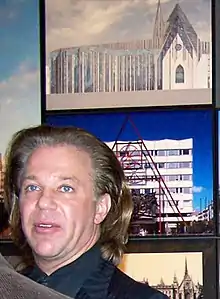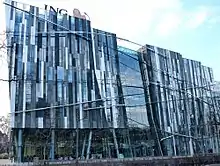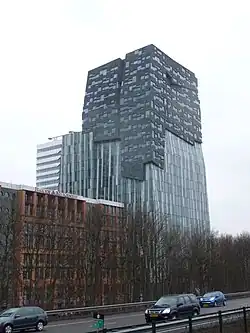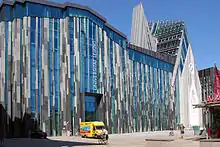Erick van Egeraat
Erick van Egeraat (Dutch pronunciation: [ˈeːrɪk fɑn ˈeːɣəraːt];[1] born 1956) is a Dutch architect and author. He heads the architectural practice based in Rotterdam with offices in Moscow, Budapest and Prague. He is best known for his projects of ING Group Headquarters in Budapest,[2] Drents Museum in Assen, The Rock tower in Amsterdam,[3] Incineration line in Roskilde,[4] Main building and Auditorium in Leipzig University[5] and the Corporate University of Sberbank in Moscow.[6] He is the winner of RIBA Award 2007,[7] Best Building Award 2011&2012[8] and European Property Award 2013.
Erick van Egeraat | |
|---|---|
 Erick van Egeraat in 2007 | |
| Born | 27 April 1956 |
| Nationality | Dutch |
| Alma mater | Delft University of Technology |
| Occupation | Architect |
| Awards |
|
| Practice | (designed by) Erick van Egeraat |
| Buildings |
|
April 26, 2016, Erick van Egeraat was decorated ‘Officer in the order of Oranje Nassau.' This decoration was presented to Erick van Egeraat by the Mayor of Rotterdam, on behalf of the King of the Netherlands.
Early career
Erick van Egeraat graduated from the Delft University of Technology, Department of Architecture. During his last year in the university, after winning the competition to design flexible youth housing at Kruisplein, Rotterdam he co-founded Mecanoo with Henk Döll, Francine Houben, Roelf Steenhuis and Chris de Weijer.[9] The early years of Mecanoo were characterized by projects which challenged the norms of urban renewal and social housing.[10] Notable projects include Housing Kruisplein, Rotterdam (1980-1985), Bilderberg Parkhotel, Rotterdam (1990-1992), House 13 at the IGA Stuttgart 1993 (1990-1993), Faculty of Economics and Management, Utrecht (1991-1995) and the Library at Delft University of Technology (1992-1998).
Later career
In 1995 Erick van Egeraat left Mecanoo and established his own company Erick van Egeraat associated architects (EEA) with offices in Rotterdam, London, Budapest, Prague and Moscow.[9] A milestone project which expressed his new architectural approach was the Headquarters of ING Bank and NNH Insurance company in Budapest (1992-1994).[11] In his own words, “It may be considered one of the first buildings to juxtapose an uncompromising modernism with intuitive organic shapes to achieve what might be called Modern Baroque”.[12] The new vision found its articulation in a variety of projects, such as Crawford Art Gallery in Cork, Ireland (1996-2000),[13] Pop-stage Mezz in Breda,[14] the Netherlands (1996-2002), Mauritskade building in Amsterdam, the Netherlands (1996-2002),[15] City Hall in Alphen aan den Rijn, the Netherlands (1997-2002)[16] and Visual Art Center in Middlesbrough, England (2007)[17] for which the architect received the RIBA award.[7]
This period was marked by a greater diversity of work, from product design (door handle Erick, 2008)[18] to master-planning (Oosterdokseiland in Amsterdam, The Netherlands, (1998-2001)[19] and increasing focus on Central and Eastern Europe where he built the Royal Netherlands Embassy in Warsaw, Poland (1999-2004),[20] ING Group Headquarters in Budapest, Hungary (1999-2004),[2] Hotel Kempinski in Bratislava, Slovakia (2004-2008) and other projects. Erick van Egeraat was particularly interested to work in historical context, as shown in his projects of Liget Center (2000-2002)[21] and Deak Palace (2003-2004) in Budapest, Hungary[22] as well as master-plan of New Holland Island in Saint Petersburg, Russia (competition 2006).[23] Working with historical buildings or in historical ambience, he aimed for “continuity and memory rather than rupture and rejection”.[24]
In 2000s Erick van Egeraat started to work actively in Russia.[25] The thrill of work in a new architectural environment made him design his "most spectacular, pure architecture project"[26] Russian Avant-Garde in Moscow (2001)[27] which made him "one of the most flamboyant architects in the Netherlands", according to the critics.[28] Russian Avant-Garde and Federation Island in Sochi (2007)[29] caused a stir and started a public discourse, but did not reach the stage of realization.[27] The others were successfully built, among them: Capital City in Moscow (2002-2010)[30] and Trade and Entertainment Center Vershina[31] in Surgut (2005-2010).[32]
In 2009 Erick van Egeraat restructured his company into (designed by) Erick van Egeraat with offices in Rotterdam, Moscow, Budapest and Prague. Despite the world crisis, his focus on complexity and quality steadily grew. In Europe he completed the projects of Drents Museum in Assen, the Netherlands (2008-2011),[33] Incineration Line in Roskilde, Denmark (2008-2013),[4] Main building and Auditorium in Leipzig University, Germany (2004-2015)[5] and Erasmus University College in Rotterdam, the Netherlands (2012-2014).[34] In Russia he built Chess Academy in Khanty-Mansiysk (2008-2010),[35] Corporate University of Sberbank in Moscow region (2010-2013)[6] and completed Mercury City Tower in Moscow (2011-2013).[36] His interest in working in historical context is manifest in his high-profile design of the new Dynamo stadium (winner of the competition, 2010)[37] and master-planning, design and consultancy works for development of the territory of the former Red October chocolate factory (since 2007).[38]
Portfolio of Erick van Egeraat includes over 100 projects in more than 10 countries, including the Middle East where he created the master-plan for the city center of Unaizah (2014).[39]
Writings and design philosophy
Erick van Egeraat authored several books. In Six Ideas about Architecture written in collaboration with Deyan Sudjic[40] he takes us to the world of a person who, just like the hero of The Fountainhead “loves this earth, but doesn’t like the shape of things on this earth and wants to change them.”[41] His definition of sustainable architecture marries beauty with quality: "We need to reintroduce architecture which once again captivates us. Beauty, strength and a focus on qualitative materials are essential elements from which a truly sustainable architecture can emerge.[42]
His later book 10 years Erick van Egeraat: Realized Works co-authored by Philip Jodidio, presents a comprehensive sweep of his oeuvre of the period 1995-2005, from the first post-Mecanoo years when he was trying to make a difference convinced that the future proof architecture needs to show "more than bare essentials".[12] to the full architectural maturity, both loyal to long-established standards of beauty and decidedly contemporary: “I believe that all architecture of historic significance was modern at the time it was built, emerging from its time and culture.”[9]
His most recent book Life without Beauty elaborates on importance of beauty in architecture which in the 20th century lost a battle to budget: “In Holland, the budget was the only subject. Many architects didn’t like the word “beauty”.[9] He claims that ultimate measure for society or human being is not ability to make money, but its achievements and the beauty it has produced.[43]
Selected projects

- 1980-1985 Housing Kruisplein - Rotterdam, the Netherlands (as partner of Mecanoo)
- 1985-1989 Housing Tiendplein - Rotterdam, the Netherlands (as partner of Mecanoo)
- 1989-1990 Restaurant Boompjes - Rotterdam, the Netherlands (as partner of Mecanoo)
- 1990-1992 Parkhotel - Rotterdam, the Netherlands (as partner of Mecanoo)
- 1992-1995 Natural History Museum - Rotterdam, the Netherlands (as partner of Mecanoo)[44]
- 1992-1994 / 1993-1997 ING office / Extension - Budapest, Hungary[12]
- 1994-1997 School for Fashion and Graphic design - Utrecht, the Netherlands[45]
- 1996-2000 Municipal Art Gallery - Cork, Ireland[13]
- 1996-2000 InHolland High School - Rotterdam, the Netherlands[46]
- 1996-2002 Pop-stage Mezz - Breda, the Netherlands[14]
- 1997-2002 City Hall - Alphen aan den Rijn, the Netherlands[16]
- 1999-2003 Villa Bianca – Prague, Czech Republic[47]
- 1999-2004 ING Headquarters - Budapest, Hungary[2]
- 2000-2004 Royal Netherlands Embassy - Warsaw, Poland[20]
- 2001-2005 Crescent housing – Nieuw Vennep, the Netherlands
- 2002-2009 The Rock Tower - Amsterdam, The Netherlands[3]
- 2002-2010 Capital City – Moscow, Russia[48]
- 2003-2004 Deak Palace refurbishment - Budapest, Hungary[49]
- 2003- 2006 Offices Zilverparkkade - Lelystad, the Netherlands[50]
- 2003-2006 Metzo College – Doetinchem, the Netherlands[51]
- 2003-2007 Visual Art Center – Middlesbrough, England[17]
- 2003-2008 Municipal Theatre – Haarlem, the Netherlands[52]
- 2003-2012 Masterplan Milanofiori - Milan, Italy[53]
- 2004-2010 Masterplan River Park - Bratislava, Slovakia[54]
- 2004-2010 Private Residence - Rotterdam, the Netherlands[55]
- 2004-2015 University Main building and Auditorium - Leipzig, Germany[5]
- 2005-2009 Lyon Confluence – Lyon, France[56]
- 2005-2010 Trade and Entertainment Center Vershina – Surgut, Russia[31]
- 2006-2011 Sumatrakontor - Hamburg, Germany[57]
- 2006-2014 Bay Mansion – Moscow, Russia[58]
- 2007-2011 Drents Museum - Assen, the Netherlands[33]
- 2008-2010 Chess Academy – Khanty-Mansiysk, Russia[35]
- 2008-2013 Incineration Line - Roskilde, Denmark[4]
- 2009-2012 Columbuskwartier - Almere, the Netherlands[59]
- 2010-2013 Corporate University of Sberbank – Moscow, Russia[6]
- 2010-2013 Erasmus University Campus and Interior - Rotterdam, the Netherlands[34]
- 2012-2013 Public spaces in Mercury City Tower – Moscow, Russia[36]
Awards and recognition
- “Animated architecture” winner at World’s best media architecture for Incineration Line in Roskilde, Denmark, (2014))[60]
- Best high-rise architecture in Russia at European Property Awards for Mercury City Tower, Moscow, Russia (2013)[61]
- Best Interior at Dutch Design Awards for Drents Museum, Assen, the Netherlands (2012)
- Best Building ‘2012 Siberia for Trade and Entertainment Center Vershina, Surgut, Russia (2012)
- Grand Prix at Golden Capital Award Siberia for Trade and Entertainment Center Vershina, Surgut, Russia (2012)
- Best Building ‘2011 Russia for Chess Academy, Khanty Mansiysk, Russia (2011)[8]
- Emporis Skyscraper Award for Capital City, Moscow, Russia (2010)
- Best mixed-use development at Commercial Real Estate Award for Capital City, Moscow, Russia (2010)
- Hadrian Award for Visual Art Center, Middlesbrough, England (2009)[62]
- US Award for Milanofiori North office buildings in Milan, Italy (2009)[63]
- RIBA award North East region for Visual Art Center, Middlesbrough, England (2007)[7]
- Renaissance Award of the Royal Institution of Chartered Surveyors for Visual Art Center, Middlesbrough, England (2007)[7]
- For Budapest Award for the “design of architectural masterpieces in Budapest, Hungary” (2006)[64]
- Reitter Ferenc Prize for refurbishment of Déak Palace in Budapest, Hungary (2006)[65]
- Life in Architecture Award for the best building in Warsaw 2004-2005, for Royal Netherlands Embassy Warsaw, Poland (2005)
- MIPIM award for Offices of ING & NNH in Budapest, Hungary (1999)
Erick van Egeraat is the professor of the International Academy of Architecture in Sofia, Bulgaria. He travels the world not only to work on his projects, but also to give lectures, workshops and master classes.
Publications
- Egeraat, E. van. Life without beauty. Tatlin publishers: Ekaterinburg, 2011. ISBN 978-5-903433-59-9.
- Leeuwen, K. van & Wagt, W. De. Het Geschenk: Stadsschouwburg Haarlem 1918 – 2009. HDC Media: Haarlem, 2009.
- Egeraat, E. van. From making buildings to offering solace to the city. EEA Erick van Egeraat associate architects: Rotterdam, 2008.
- Jodidio, P.; Egeraat, Erick van (2005). 10 years Erick van Egeraat: realized works. Australia: Images Publishing Group. ISBN 1-86470-131-5.
- Egeraat, E. van. Redefining Budapest, Offices for a new era. Pauker Nyomda, 2005.
- Sudjic D., D. & Egeraat, E. Van. For Russia with love. Aedes: Berlin, 2003.
- Lammers, M., Spangenberg W., Houweling W.J. Ichthus Hogeschool Rotterdam, een gedurfd project. Bouwen aan Zuid-Holland: pp. 11–17, 2000.
- Sudjic D., & Egeraat, E. van. Cool Medium Hot. Aedes: Berlin, 1997.
- Egeraat, E.; Sudjic, Deyan (1997). Six ideas about architecture. Basel: Birkhäuser Verlag. ISBN 3764356391.
- Egeraat, E. van & Lammers, M. The Andrassy Project. Delft, 1994.
- Feddes, F., Egeraat, E. van, Houben, F. Ruimte voor Ruimte. Groningen, 1990.
- Egeraat, E. van & Houben, F. De Hillekop, op zoek naar een poëtische relatie met de haven. Rotterdam Stedebouwkundige ontwerpen: pp. 54–62, 1988.
- Döll, H. & Egeraat, E. Van (ed.) Woningbouw Kruisplein. Anders wonen in Rotterdam. Academia: Delft, 1985.
References
- In isolation, van is pronounced [vɑn].
- "Erick van Egeraat provides a shot of architectural adrenaline". Architectural Record. January 2006.
- "Erick van Egeraat Office Tower". Scene. 16 November 2011.
- "Erick's van Egeraat Beacon Roskilde Incineration line". Designboom. 8 June 2013.
- "Aula Leipzig University". E-Architect. 4 June 2014.
- "Like pearls on a string". Mapolis. 12 February 2012.
- "Erick van Egeraat wins RIBA and Renaissance awards". Europe-re. 29 May 2007.
- "Designed by Erick van Egeraat wins a Russian Best Building Award 2011". Archined. 20 October 2011.
- Jodidio & Egeraat 2005, p. 6.
- Egeraat, E. van & Sudjic D. Six ideas about architecture. Birkhäuser: Basel, 1997, p.9
- "ING Bank/van Egeraat Budapest". Financial Times. 17 September 2004.
- Jodidio & Egeraat 2005, p. 7.
- "Going Dutch". Archiseek. 10 December 2000.
- "Popstage in Dutch city of Breda by Erick van Egeraat". Infoteli. 11 January 2011.
- "Mauritskade apartment building". Phaidon Atlas. Retrieved 28 November 2014.
- Jodidio & Egeraat 2005, p. 10.
- "Mima Middlesbrough Institute Of Modern Art". Europaconcorsi. 2 April 2007. Archived from the original on 2014-12-05.
- "Erick van Egeraat designs a door handle for Post en Eger". Dexigner. 16 March 2008. Archived from the original on 14 October 2016. Retrieved 13 October 2016.
- "Architecture". Oosterdokseiland.nl. Archived from the original on 11 April 2015. Retrieved 27 November 2014.
- "Embassy in the garden". Polen voor Nederlanders. Retrieved 27 November 2014.
- Jodidio & Egeraat 2005, p. 9.
- Jodidio & Egeraat 2005, p. 56.
- "Fantasy Island". St. Petersburg Times. 17 February 2006.
- Egeraat & Sudjic 1997, p. 15.
- Jodidio & Egeraat 2005, p. 12.
- Jodidio, P. (2005). Architecture:Art. Munich, Berlin: Prestel Verlag. p. 224.
- "A chasm between projects and buildings". Russia beyond the headlines. 25 October 2011.
- Jodidio 2005, p. 224.
- "Island Paradise". Passport magazine. August 2008.
- Egeraat, E. van (2005). Capital City Moscow. Amsterdam: Book Industry Services. ISBN 9063691173.
- "Vershina Trade and Entertainment Centre". Architect. 2 April 2012.
- "The Comeback Kid". The Moscow Times. 1 November 2007.
- "Green roofs are changing architecture". Tree hugger. 6 June 2012.
- "Erasmus University College in Rotterdam". Stealmag. 12 July 2014.
- "A very clever move". World Architecture News. 21 October 2011. Archived from the original on 4 December 2014. Retrieved 28 November 2014.
- "Europe's tallest building in Russia designed by Dutch-architect Erick van Egeraat". PR Newswire. 17 November 2012.
- "A multifunctional redevelopment readies Russian for its future World Cup bid". A10.eu. 7 July 2010. Archived from the original on 6 December 2014. Retrieved 28 November 2014.
- "Red October with the Dutch stuffing". Rus News Journal. Retrieved 28 November 2014.
- "Saudi city goes underground to avert vehicular traffic". Green Prophet. 6 August 2014.
- Egeraat & Sudjic 1997.
- Rand, A. The Fountainhead. Penguine Group (USA), 1994, e-ISBN 978-1-101-13718-5, p.32
- Egeraat & Sudjic 1997, p. 80.
- Egeraat, E. van. Life without beauty. Tatlin publishers: Ekaterinburg, 2011, p. 155
- Architecture Today Archived 2015-04-05 at the Wayback Machine], 2 November 1995
- DETAIL, July 1999
- "Extension Inholland University by Erick Van Egeraat Reaches Highest Point". Dexigner. 14 June 2007. Archived from the original on 14 October 2016. Retrieved 13 October 2016.
- "Villa Bianca Uphill Upscale". Prague Post. 18 September 2002. Archived from the original on 2015-04-02.
- Egeraat 2005.
- "Budapest buildings, Hungary, Erick van Egeraat". E-Architect. Retrieved 28 November 2014.
- "Office building in Zilverparkkade Lelystad". erickvanegeraat.com. Archived from the original on 2 April 2015. Retrieved 28 November 2014.
- "Metzo College". Phaidon Atlas. Retrieved 28 November 2014.
- "Erick van Egeraat completes municipal theatre Haarlem". Theatre Architecture. 1 December 2008.
- "Milanofiori North, Milan". E-Architect. 23 May 2007.
- "What is River Park?". riverpark.sk. Retrieved 28 November 2014.
- "Client moves into private residence". erickvanegeraat.com. 22 April 2010. Archived from the original on 2013-09-21.
- "Van Egeraat's Lyon Monolith opens". bdonline.co.uk. 15 October 2010.
- "Sumatrakontor by Erick van Egeraat". Dezeen. 20 January 2012.
- "Bay Mansion". erickvanegeraat.com. Archived from the original on 2 April 2015. Retrieved 28 November 2014.
- "Columbuskwartier Almere". erickvanegeraat.com. Archived from the original on 2 April 2015. Retrieved 28 November 2014.
- "World's best media architecture awarded". Media Architecture. 21 November 2014.
- "Moscow Mercury Tower wins Best High Rise Award". Media Architecture. 14 October 2013.
- "You are looking good; Art Gallery and Square win design award". Evening Gazette. 10 December 2009.
- "Erick van Egeraat received Italian Us Award". Archined. 9 February 2010.
- "Erick van Egeraat's new projects and awards in the UK, France and Hungary". Europe-re. 5 January 2007.
- "EEA: new projects and awards". HH. 5 January 2007.

